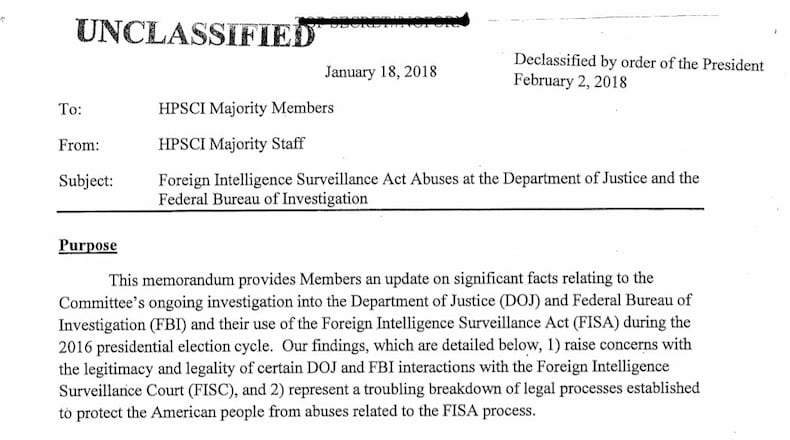After approval by President Donald Trump, Republicans on the House Intelligence Committee have released a controversial memo about FBI surveillance in the investigation of Russian interference into the 2016 elections, going against the arguments of the FBI Director and Department of Justice officials, who had expressed concerns about release of the information.
"I think it's a disgrace, what's going on in this country, I think it's a disgrace," the President told reporters during a photo op in the Oval Office.
"A lot of people should be ashamed of themselves," Mr. Trump said without going into any detail on what was in the memo.
Asked whether he still had confidence in the Deputy Attorney General, the President did not give Rod Rosenstein a pat on the back.
"You figure it out," he said coldly.
Most of the memo deals with surveillance in 2016 on only one person who had ties to the Trump campaign, Carter Page, who was a foreign policy adviser.
Page became a person of interest after he took a July 2016 trip to Moscow; at about the same time, the FBI was getting hints that something was amiss involving Russian activity related to the race for President.
But Republicans argue what happened next was that the FBI allowed itself to be pushed into surveillance of Page, by relying on a dossier that had roots in the Democratic National Committee.
Credit: Jamie Dupree
Credit: Jamie Dupree
But if the date in the memo is correct, by the time the FISA surveillance warrant was approved - October 21, 2016 - Carter Page was no longer associated with the Trump campaign.
This wasn't the first that the FBI and U.S. Intelligence had become interested in Page's contacts with Russia.
Back in 2013, the FBI had come across Page while trailing Russian intelligence agents who were working undercover in New York City, as his name popped up in wiretaps of those Russian operatives.
In 2015, the feds unveiled criminal charges against several Russian intelligence agents, who were operating an undercover spy ring in New York City - one of those caught up in that case was Carter Page, referred to in the charging documents as "Male-1."
Credit: Jamie Dupree
Credit: Jamie Dupree
CNN reported back in August that a FISA warrant had been obtained against Carter Page once before in 2014 - but this issue deals with a separate FISA warrant during 2016, as Page visited Moscow in July of that year.
In testimony before the House Intelligence Committee in November of 2017, Page repeatedly denied any wrongdoing, as he pointed the finger of blame at the Obama Administration, charging that the folder containing his FISA warrant "will inevitably be filled with a potpourri of falsehoods from the Clinton/Obama regime."
Republicans jumped on the release of the memo to point the finger of partisan blame at the FBI.
The GOP memo reveals that the FBI "terminated" Steele as a source, because Steele had spoken to reporters.
Republicans then detailed previously known contacts between Steele and Bruce Ohr, then a top official at the Justice Department. The memo says that Ohr felt Steele "was passionate" about Trump not being elected President.
"This clear evidence of Steele's bias was recorded by Ohr at the time and subsequently in official FBI files - but not reflected in any of the Page FISA applications," the GOP memo charges.
Credit: Jamie Dupree
Credit: Jamie Dupree
There was no immediate comment from the FBI, which made clear earlier this week that it believed the GOP memo did not accurately reflect facts of the case.
The GOP memo also says that former FBI Deputy Director Andrew McCabe testified in December 2017, "that no surveillance warrant would have been sought from the FISC (FISA court) without the Steele dossier information.
The House Intelligence Committee has not released the transcripts of that extensive session with McCabe. This memo did not include supplementary materials on that point and others.
Democrats said the document had little of import.
"The Nunes memo is the biggest letdown since Al Capone’s vault," said Rep. Brendan Boyle (D-PA).
About the Author
The Latest
Featured






